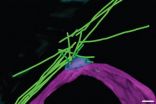(Press-News.org) Jerusalem, April 30, 2012 – Our solar system is four and a half billion years old, but
its formation may have occurred over a shorter period of time than we previously thought, says an international team of researchers from the Hebrew University of Jerusalem and universities and laboratories in the US and Japan..
Establishing chronologies of past events or determining ages of objects require having clocks that tick at different paces, according to how far back one looks. Nuclear clocks, used for dating, are based on the rate of decay of an atomic nucleus expressed by a half-life, the time it takes for half of a number of nuclei to decay, a property of each nuclear species.
Radiocarbon dating for example, invented in Chicago in the late 1940s and refined ever since, can date artifacts back to prehistoric times because the half-life of radiocarbon (carbon-14) is a few thousand years. The evaluation of ages of the history of earth or of the solar system requires extremely "slow-paced" chronometers consisting of nuclear clocks with much longer half-lives.
The activity of one of these clocks, known as nucleus samarium-146 (146Sm), was examined by Michael Paul, the Kalman and Malke Cooper Professor of Nuclear Physics at the Hebrew University of Jerusalem, as well as researchers from the University of Notre Dame and the Argonne National Laboratory in the US and from two Japanese universities.
146Sm belongs to a family of nuclear species which were "live" in our sun and its solar system when they were born. Events thereafter, and within a few hundred million years, are dated by the amount of 146Sm that was left in various mineral archives until its eventual "extinction."
146Sm has become the main tool for establishing the time evolution of the solar system over its first few hundred million years. This by itself owes to a delicate geochemical property of the element samarium, a rare element in nature. It is a sensitive probe for the separation, or differentiation, of the silicate portion of earth and of other planetary bodies.
The main result of the work of the international scientists, detailed in a recent article in the journal Science, is a new determination of the half-life of 146Sm, previously adopted as 103 million years, to a much shorter value of 68 million years. The shorter half-life value, like a clock ticking faster, has the effect of shrinking the assessed chronology of events in the early solar system and in planetary differentiation into a shorter time span.
The new time scale, interestingly, is now consistent with a recent and precise dating made on a lunar rock and is in better agreement with the dating obtained with other chronometers.
The measurement of the half-life of 146Sm, performed over several years by the collaborators, involved the use of the ATLAS particle accelerator at Argonne National Laboratory in Illinois.
INFORMATION:
'Faster-ticking clock' indicates early solar system may have evolved faster than we think
2012-05-02
ELSE PRESS RELEASES FROM THIS DATE:
Grauer School Faculty Member Receives Distinguished YMCA 'Service to Youth' Award
2012-05-02
Grauer School Teacher and Community Service Coordinator, Jessi Young, received the prestigious "Irvin C. Chapman Outstanding Service to Youth Award" by the YMCA at the Youth and Government's 64th annual Model Legislature and Court Conference in Sacramento in February. Steve Willmont, President and CEO of Youth and Government as well as past recipient of the award, presented the award to Jessi for demonstrating longstanding dedication and commitment to youth both inside and outside of the program. Jessi teaches both Spanish and History at Grauer School and also ...
Martin Reichle from Reichle & De Massari (R&M) to Visit Qatar to Strengthen Ties with Local Companies
2012-05-02
Martin Reichle, owner & Executive Board Member of Reichle & De-Massari (R&M) is set to make a four day business trip to Doha, Qatar between the 5th and 8th of May, 2012. Accompanying him will be Jean-Pierre Labry, Executive Vice President of R&M Middle East and Africa, as well as other members of the R&M MEA management team. R&M has been present in the region for the past 12 years and Martin Reichle is visiting Qatar to increase the company's focus on the fast developing market.
R&M will host a customer event on the 7th of May 2012, at which ...
Greener Building Materials - Advances Impacting Industry Sustainability, in Construction Digital
2012-05-02
The building sector is on the front lines of the sustainability movement - meaning that innovations within the industry stand to make a substantial impact on climate change and the environment. This month, we're taking a look at developments in building materials that promise to make green building a smarter, more efficient and effective vehicle for a shift in the global paradigm of sustainability.
Phase change materials (or PCMs) are set to radically cut heating and energy bills with their revolutionary properties that enable them to become liquid in warm temperatures, ...
Scientists make stunning inner space observations
2012-05-02
Scientists using high-powered microscopes have made a stunning observation of the architecture within a cell – and identified for the first time how the architecture changes during the formation of gametes, also known as sex cells, in order to successfully complete the process.
The findings by the international team led by the University of Leicester could impact on the treatment of disorders caused by a misregulation of cellular structures called microtubules. These disorders include Down's Syndrome, lissencephaly (a brain formation disorder) or cancer.
Researching ...
Oil Market Speculations Affect Pump Prices, and the General Public Frantic as the US Explores Unconventional Resources to Cope, in Energy Digital
2012-05-02
The latest issue of Energy Digital is free online for business Executives in the energy industry.
A lot is going on in the oil industry today--from Iran's threats to close the Strait of Hormuz to civil unrest in Syria and Nigeria, threatening some of the world's most critical pipelines. This month, we discuss the implications of those world events in regards to global economic growth with an expert from the Economic Intelligence Unit, Caroline Bain.
On a positive note, last month's CERAWeek conference showed signs of strong efforts within the industry to develop ...
Cereplast, a Leading Bioplastics Company, Discusses the Industry Potential in the Face of Volatile Oil Prices and Mixed Consumer Feedback, in Energy Digital
2012-05-02
The U.S. plastics industry accounts for about 10 percent of the country's total oil consumption. And despite widespread public outrage about the harmful environmental impacts of plastic bottles and bags, among other ubiquitous items of daily life, only about one percent of that is recycled.
Fortunately, technologies and consumer demands for greener products have created an entire industry dedicated to changing the resources used for the products in our throw-away culture--bioplastics (PLA). Derived from renewable biomass sources, such as vegetable oils, corn starch ...
Industry Leaders Gather at CERAWeek to Discuss Potential Domestic Energy Resources to Increase America's Energy Security, in Energy Digital
2012-05-02
This month, CERAWeek provides optimism for the energy industry as executives gather to discus environmental responsibility and transparency as the keys to success.
The 2012 CERAWeek showcased a tremendous sense of optimism within the U.S. and global energy industry, largely due to the potential for vast new oil and natural gas reserves. Industry leaders also exhibited a sincere appreciation for public concern over the technologies used to extract these resources; and specifically noted that concerns related to hydraulic fracturing or "fracking" are legitimate ...
Spot a bot to stop a botnet
2012-05-02
Computer scientists in India have developed a two-pronged algorithm that can detect the presence of a botnet on a computer network and block its malicious activities before it causes too much harm. The team describes details of the system in a forthcoming issue of the International Journal of Wireless and Mobile Computing.
One of the most significant threats faced by computer networks is from "bots". A bot is simply a program that runs on a computer without the owner's knowledge and carries out any of a number of tasks over the network and the wider internet. It can run ...
Getting the Job Done Despite the Risk, in Supply Chain Digital
2012-05-02
Although supply chain officers are starting to crop up in the boardroom, they've usually been the behind-the-scenes types - you know, the bean-counters making sure everything gets everywhere so everyone can have everything they want. It's not a small job, and it's usually not a very glamorous one either.
And yet, with natural disasters causing major disruptions in the global supply chain and markets rollicking as a result, it's not the charismatic leaders who can get us where we need to be. It's the bean counters.
Good supply chain operations means getting the job ...
Stun guns not safe for citizens, but benefit police, study finds
2012-05-02
EAST LANSING, Mich. — The use of stun guns by police significantly increases the chances of citizen injury, yet also protects the officers more than other restraint methods, according to the most comprehensive research to date into the safety of stun guns in a law enforcement setting.
William Terrill, lead researcher on the project and Michigan State University criminologist, said the federally funded research presents a dilemma for police agencies weighing use of the controversial weapon. Nationally, some 260,000 electronic control devices, or stun guns, are in use in ...


